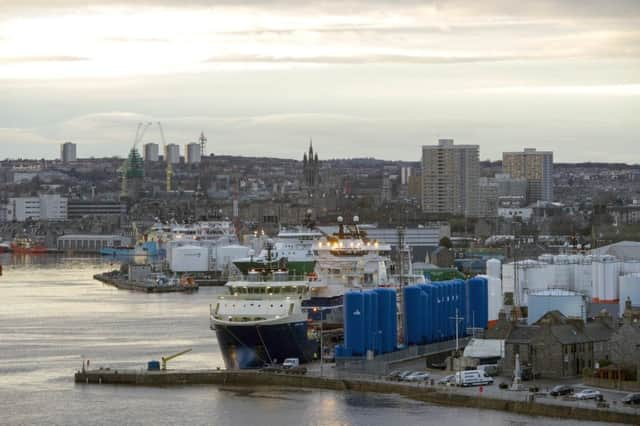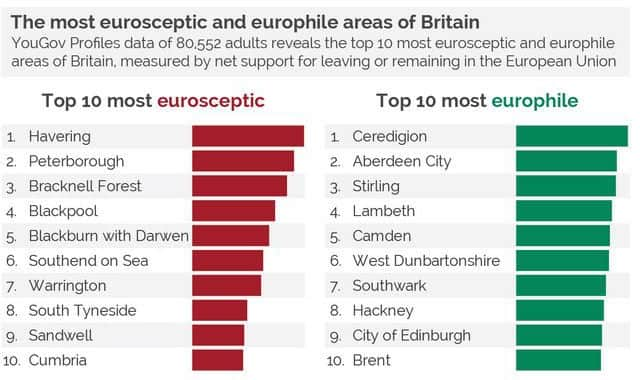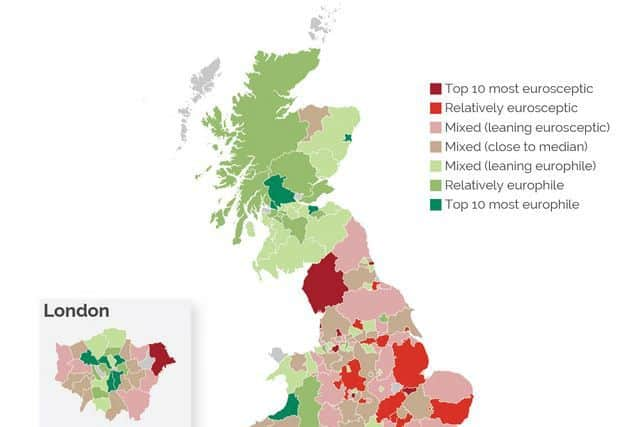Why are some areas of Scotland so pro-European Union?


That is the number of Euros that Jenny Laing has helped to attract from the EU to Aberdeen to help diversify opportunities on offer in Europe’s waning oil capital.
Aberdeen came out second in a recent poll of the UK’s most Europhile places behind only Ceredigion in Wales. Stirling came third, West Dunbartonshire sixth and Edinburgh ninth in the YouGov research.
Advertisement
Hide AdAdvertisement
Hide AdFor Ms Laing, leader of the ruling Labour/Conservative/Independent coalition since May 2014, the city’s relationship with Europe had “never been more important” as it looks beyond the boom years of oil and gas production.


She said the council had gained from Europe at a time when Aberdeen City Council remains the lowest funded local authority in Scotland per capita.
Ms Laing said: “We are competing with various cities around the world such as Houston, Stavanger and Perth in Australia but we have very much had under investment in the North East over a number of decades.
Ms Laing added: “Because of these poor funding settlements, we do have a history of looking at other funding sources and we have been very proactive around Europe especially.


“We have seen there is funding to tap into if you have the projects and the aspiration.”
Ten hydrogen buses have been bought and Scotland’s first commercial refuelling station now built in the city. It was now “leading the pack” in this field. Ms Laing said.
She added: “Aberdonians have always operated on a global scale. It doesn’t make sense to Aberdonians to shrink opportunities and markets. It’s a population with a very outward looking perspective.”
Ms Laing said the EU remained significant market for North Sea oil with UK government figures showing exports worth £15.1bn were made to the EU in 2014 with Netherlands, Germany and France the biggest buyers. Non EU exports totalled £17.4bn.


Advertisement
Hide AdAdvertisement
Hide AdShe added: “What will be so important to Aberdeen is that we anchor the oil and gas supply chain in the North East . We want to make sure that these companies remain in the North East and that the markets, not just European but world wide markets, remain open.”
Aberdeen & Grampian Chamber of Commerce said last week that 76 per cent of its businesses would vote to remain in the EU. This compares to a national UK average of 54 per cent and a Scottish average of 68 per cent.
Meanwhile, sections of the North East, particularly those linked to the fishing industry, are campaigning hard to cut Brussels out of the equation.


Ross Thomson the newly elected Conservative list MSP for the North East is also campaigning for Brexit.
He said funding for key projects such as the Aberdeen hydrogen buses could be “replicated and continued” in the event of a Leave vote.
Mr Thomson added that small to medium sized business – and not just large oil companies – had to be protected.
“Only 10 per cent of UK trade is done with the EU but they still have to abide by 100 per cent EU regulation. We have the highest number of start ups in Scotland in the North East – around 1,300 last year – and they are burdened with huge amounts of regulation.
“The North East is not just about the big BPs or the Shells. We need to be supporting the smaller companies too.”
Advertisement
Hide AdAdvertisement
Hide AdIn Stirling, Steven Paterson MP (SNP) said it was “no surprise” that the city was ranked third in the list of Europhile hot spots given the strong agricultural influence in the area.
The EU invests around £630 million into Scottish farming communities every year, he added, with other funding received by the Sporting Chance Initiative at Stirling University, which promotes sport-led business, Stirling Enterprise Park and the project to restore the city’s historic Engine Shed.
He added: “However, opinion polls do not decide our future in Europe and I fully understand concerns that a number of my constituents have brought to me regarding the EU.”
In West Dunbartonshire, EU money has been granted to the local authority for two programmes to help people get back to work and grow business in the former heavy industrial area, which includes Clydebank and Dumbarton.
Stewart Rennie, president of Dunbartonshire Chamber of Commerce said: “The people of West Dunbartonshire are better able to appreciate the benefits of EU membership as they can see the advantages in cash terms.”
Only Moray, a key whisky production area, showed any sort of Eurosceptic leanings in the You Gov poll but even then attitudes were judged to be mixed.
Sarah Medcraf, chief executive of Moray Chamber of Commerce, said members in the area - which also counts manufacturing and defence as key employers - had “firmly held views” on either side of the debate and that many firms were “planning for the future” in event of either referendum result.
Follow us: @TheScotsman on Twitter | TheScotsmanNewspaper on Facebook
